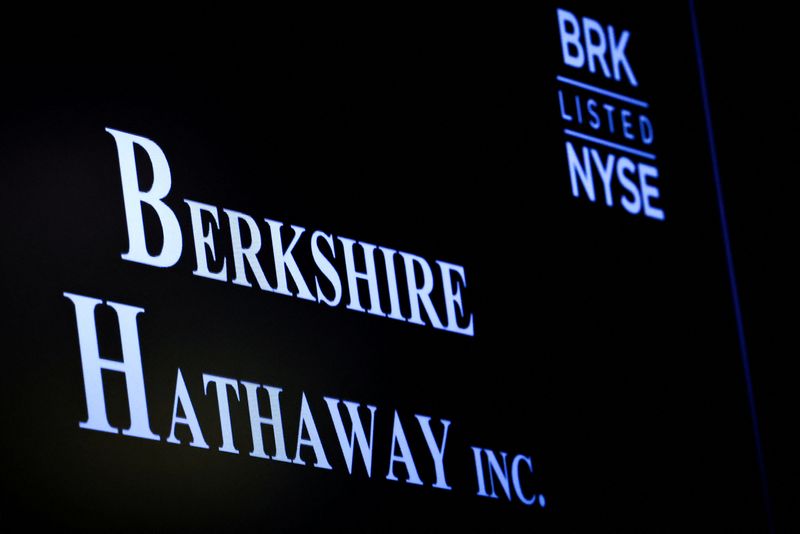Wildfires dent Berkshire’s profit; cash soars to $347.7 billion

By Jonathan Stempel and Carolina Mandl
OMAHA, Nebraska/NEW YORK (Reuters) -Warren Buffett’s Berkshire Hathaway (NYSE:BRKa) on Saturday posted a lower operating profit in the first quarter, dented by insurance losses from wildfires and foreign currency changes, while its cash stake grew to a record $347.7 billion.
Operating profit for the Omaha, Nebraska-based conglomerate dropped 14% to $9.64 billion, or about $6,703 per Class A share, from $11.22 billion a year earlier.
Net income was down 64% to $4.6 billion, or $3,200 per Class A share, from $12.7 billion, reflecting unrealized losses on common stock holdings including Apple (NASDAQ:AAPL).
The cash stake grew from $334.2 billion at year-end, reflecting Berkshire’s difficulty finding things to buy.
It repurchased none of its own stock for a third straight quarter, and was a net seller of stocks for a 10th straight quarter, buying $3.18 billion and selling $4.68 billion.
Berkshire said little about how U.S. President Donald Trump’s tariff policies affected results.
It said in its quarterly report that "considerable uncertainty remains," and Berkshire was "unable to reliably predict" the potential impact on the company, including as to product costs, supply chain costs and customer demand.
Results included $1.1 billion of losses on insurance claims stemming from the Los Angeles-area wildfires in January.
That caused overall net income from insurance to fall by nearly half, to $1.34 billion.
The wildfire losses offset continued improvement at the Geico car insurer, as increased premiums and reduced accident claims helped push pre-tax underwriting profit up 13%.
3rd party Ad. Not an offer or recommendation by Investing.com. See disclosure here or remove ads.Results also included $713 million of currency-related losses as the U.S. dollar weakened, compared with a $597 million gain a year earlier.
The results were released ahead of Berkshire’s annual shareholder meeting in Omaha, part of a weekend that draws tens of thousands of people to the city.
Buffett, 94, has led Berkshire for 60 years, transforming it from a struggling textile company into a conglomerate whose businesses include Geico, the BNSF railroad, Berkshire Hathaway Energy, Dairy Queen and See’s Candies.
Berkshire shares have far outperformed the broader market in 2025, with many investors viewing the company as a safe haven from potential disruptions to the economy, including from tariffs.
In other businesses, tariffs may have temporarily helped the BNSF railroad, where profit rose 6%.
BNSF reported higher volumes for consumer products, including west coast imports and automotive vehicles, which suggests higher demand for shipments before tariffs kicked in.
Berkshire Hathaway Energy also fared better, increasing profit 53% through broad-based gains and a lower loss at the HomeServices real estate brokerage unit.
Profit fell 1% at Berkshire’s manufacturing, service and retailing businesses.
Berkshire’s collection of car dealerships benefited from higher sales of new and use vehicles.
But home furnishings and other retailing businesses struggled with what Berkshire called "increased competition, sluggish demand and impacts of higher economic uncertainty."
Should you invest $2,000 in AAPL right now?With AAPL making headlines, savvy investors are asking: Is it truly valued fairly? In a market full of overpriced darlings, identifying true value can be challenging. InvestingPro's advanced AI algorithms have analyzed AAPL alongside thousands of other stocks to uncover hidden gems. These undervalued stocks, potentially including AAPL, could offer substantial returns as the market corrects. In 2024 alone, our AI identified several undervalued stocks that later surged by 30 or more. Is AAPL poised for similar growth? Don't miss the opportunity to find out.
Reveal Undervalued Stocks Now